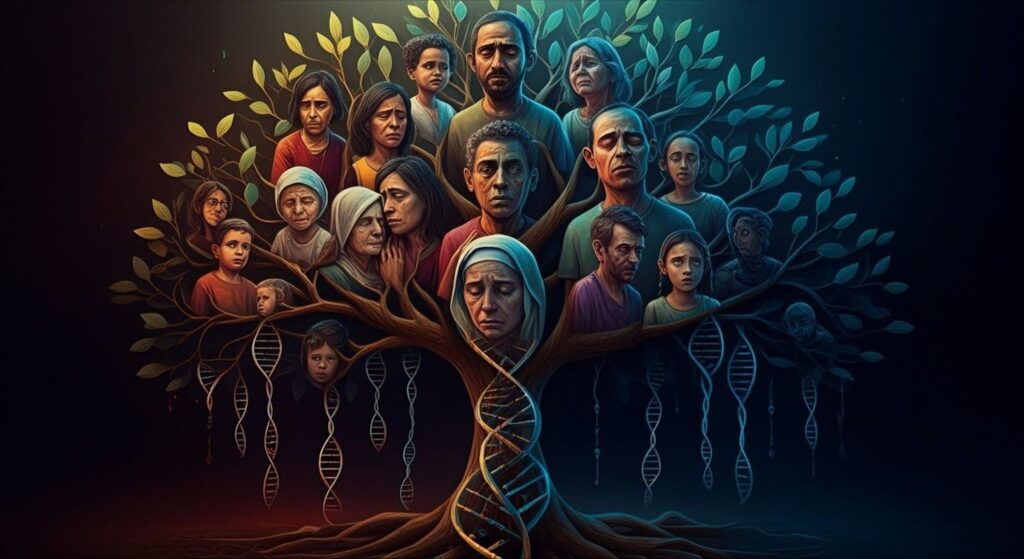Generational trauma, sometimes referred to as intergenerational or transgenerational trauma, describes the psychological and emotional effects of trauma passed down from one generation to the next. It’s not just about the stories we hear from our parents or grandparents; it’s the unspoken legacies of pain, fear, and resilience that shape family dynamics, behaviors, and even our mental health.
Let’s explore its origins, signs, and how healing is possible.
Understanding Generational Trauma
At its core, generational trauma stems from significant events or prolonged periods of hardship experienced by earlier generations. Trauma can be defined as a cognitive dissonance between your sense of who you are and something that happened to you. Traumatic events have the potential to exert a profound impact on our fundamental conception of selfhood, consequently shaping our perspective of ourselves and the world we inhabit. Examples of such events include, but are not limited to:
- Systemic Oppression: Racism, colonization, or discrimination.
- Historical Events: Wars, genocides, or forced migrations.
- Immigration: Migrants, refugees, asylum seekers, all types of immigrants.
- Family Struggles: Emotional, physical, sexual, abuse, neglect, abandonment, addiction, or poverty.
These experiences create cycles of trauma where unresolved pain and coping mechanisms are unknowingly passed down. For instance, a parent who grew up in an environment of fear may have difficulty expressing emotions or fostering a sense of safety, impacting their child.
Research shows that generational trauma isn’t just behavioral—it may also be biological. Studies in epigenetics suggest that trauma can alter how our genes are expressed, potentially influencing stress responses in future generations.
Signs of Generational Trauma
Recognizing generational trauma is the first step in breaking the cycle. Some common signs include:
- Emotional Patterns: Anxiety, depression, or feelings of unworthiness that seem to have no apparent source.
- Family Behaviors: Cycles of addiction, abuse, or emotional unavailability.
- Relationship Challenges: Difficulty forming or maintaining healthy connections.
- Chronic Stress: Physical symptoms such as headaches, fatigue, or insomnia linked to unresolved emotional stress.
If these patterns feel familiar to you it’s worth exploring their roots and considering how mental health or behaviors you may wish to change have been shaped by past generations.
Breaking the Cycle of Trauma
Healing generational trauma isn’t easy, but it is possible. Here are some steps to consider:
1. Acknowledge the Trauma
Understanding that your experiences may be tied to your family’s past can be empowering: you become the change maker, the cycle breaker. It’s not about assigning blame but recognizing patterns and their origins.
2. Open Communication
When it feels safe, talking with family members about their experiences can provide valuable insights. Sharing stories helps uncover the unspoken struggles that shaped your family’s dynamics. Vulnerability, with a safe person, reduces shame and increases empathy and connection. How you approach these conversations makes all the difference, be curious about your family stories, show the empathy you wish to receive, and seek first to understand your relative before you share about how these experiences are affecting you.
3. Seek Therapy
Professional support can make a significant difference. Once you have acknowledged and identified these patterns, you will know what your triggers are, and you can learn to:
- Cognitive Reframing: Change negative beliefs about yourself and the world
- Distress Tolerance: Develop healthier coping mechanisms
- Interpersonal Effectiveness: Be effective in your interpersonal interactions and set boundaries
- Emotional regulation: Choose your response to your emotions and use them as fuel to get you where you want to go
A therapist can also help you process your trauma with therapies such as EMDR, somatic therapy, narrative therapy, and ketamine-assisted therapy. This process will reduce the intensity of your physical and emotional reactions to this inherited pain and help to integrate these traumatic events into a positive sense of self.
4. Practice Self-Care and Post-Traumatic Growth
Breaking trauma cycles requires strength and patience. Prioritize activities that nurture your mental and physical well-being, such as mindfulness, exercise, creativity, or time in nature.
Why Breaking the Cycle Matters
Avoidance of thoughts or reminders of our traumatic experiences leads to PTSD. However, when you face painful emotions and thoroughly traumatic memories, you can experience a significant advance in personal development and a more profound sense of self than you had before the trauma. We call this post-traumatic growth, which can include:
- Enlightened perspectives on yourself and the world
- Greater self-advocacy
- Openness and excitement about new possibilities
- A newfound or deepening spirituality
- More fulfilling and healthy connections with loved ones and your communities
Generational trauma doesn’t just impact individuals; it shapes families and communities. By addressing these patterns, you’re fostering personal growth and creating a healthier environment for future generations. Imagine the ripple effect of healing yourself —breaking free from cycles of pain and passing down the wisdom and enthusiasm for life you have gained.
Final Thoughts
Generational trauma may feel like a heavy burden, but it’s also an opportunity for profound transformation. Acknowledging and addressing this inherited pain can lead to deeper self-awareness, healthier relationships, and a brighter future for you and perhaps for all the people you impact in your lifetime.
If you’re ready to take the next step, the team at Roots and Branches Therapy is here to support you. Our therapists feel a genuine privilege in walking with you along your path to healing generational trauma, offering empathetic care every step of the way. Take your first step by booking an informational appointment.


